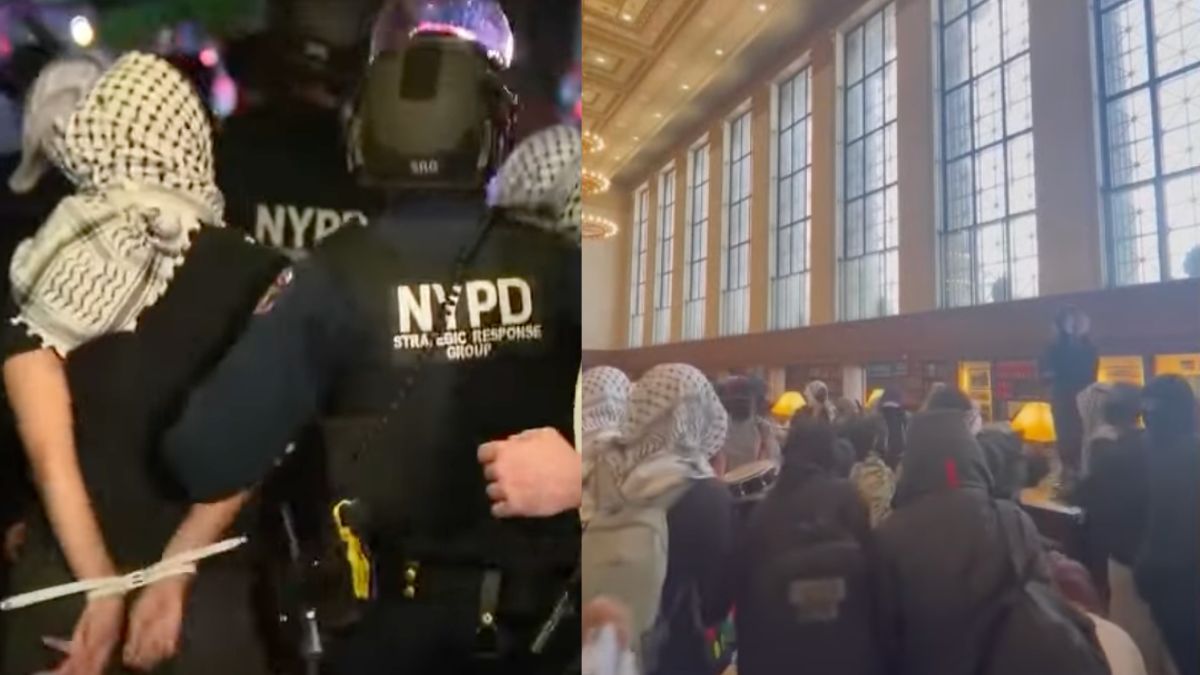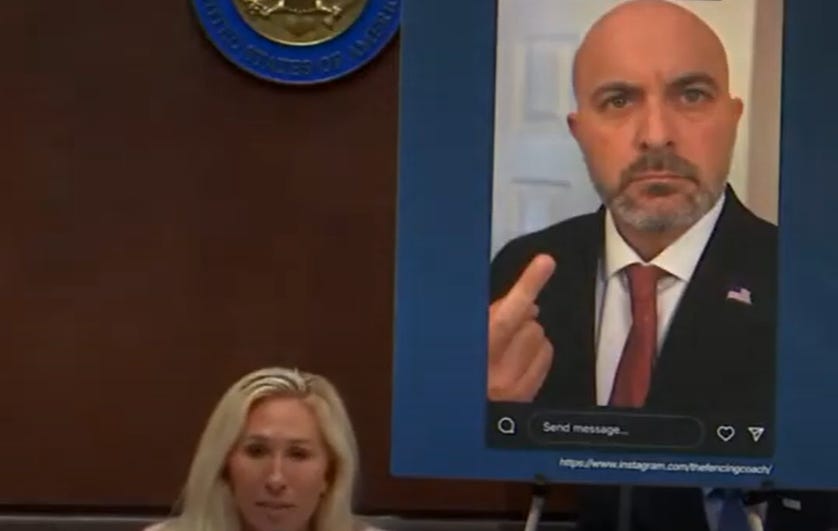When Donald Trump took the oath of office for the second time, his hand wasn’t on the Bible, an exceedingly odd omission for a president with such fervent religious supporters and who is very familiar from his years of litigation with the proper way to take an oath. Why he chose to leave his arm at his side instead of engaging the Bible will come under scrutiny in the coming days, but so should other omissions from his combative inaugural address. These elisions suggest a shrewdness that Trump’s opponents would be wise not to underestimate.
After being sworn in, his first talk with the nation had continuity with other presidential inaugural addresses. Like other incoming presidents, he tended to exaggerate the country’s woes, the better to make his arrival seem like deliverance. But Trump took it further, not merely exaggerating the country’s ills but fabricating new ones. “My recent election is a mandate to completely and totally reverse a horrible betrayal and all of these many betrayals that have taken place,” Trump told those gathered in the U.S. Capitol’s Rotunda, “and to give the people back their faith, their wealth, their democracy, and indeed, their freedom. From this moment on, America’s decline is over.”
But any red skeins of normalcy connecting Trump to previous inaugural speakers were frayed or nonexistent. Usually, the incoming president offers some nod to the outgoing one, if only to praise their cooperation during the transition. No one mistakes the tip of presidential hats to one’s predecessor for genuine affection, like when Ronald Reagan praised Jimmy Carter for the transition. It’s a form of politesse to reassure the country that this isn’t a time for enmity. But acknowledging that Biden was on the dais was about the closest Trump could come to adhering to this norm. While Trump ticked off the name “Biden” as he welcomed former presidents, he put the 46th president in the crosshairs. “The vicious, violent, and unfair weaponization of the Justice Department and our government will end,” Trump brayed, putting his personal prosecution in the third paragraph of his address.
Lest his meaning was unclear, he returned to talk about his alleged persecution, linking his attempted assassination with the myriad civil and criminal prosecutions that he’s faced.
What else was missing from the speech? The words “Russia,” “Ukraine,” “NATO,” “Israel,” and “unborn” (or its variants). Tax cuts didn’t get a shout, which is surprising considering what’s at the top of his agenda, but also wise. It was smart not to engage in the coming showdown over Ukraine or emphasize the tax cut portion of his agenda. Tariffs and trade got some love and misrepresentation, as did Trump’s new favorite president, William McKinley, whose name he’s determined to restore to the continent’s tallest mountain, Denali—a moniker long-ago approved by Alaskans of all parties.
Canada did not get a shout-out, which was wise, although Trump has expressed territorial ambitions toward the second-largest nation in the world. Expanding “our territory” was about as close as the 78-year-old came to laying claims on Greenland or Canada, but he was more explicit with Panama. He said of the Canal: “We’re taking it back,” which wouldn’t seem to leave much room for negotiating fees or Chinese presence in the Canal zone.
God was mentioned, as he/she/they always receive. (More on pronouns in a minute), but school prayer was wisely elided. Charles Darwin suffered no slights from Trump, so thank heavens for that. Avoiding the hopes of his more zealous backers was wise.
It was Martin Luther King Jr. Day and Inauguration Day, and the martyred prince of nonviolence got a name check: “We will strive together to make his dream a reality. We will make his dream come true.” Trump didn’t define the King’s dream but threw a bouquet to “a society that is colorblind and merit-based,” probably the squarest critique of affirmative action in a presidential inaugural address since the policy’s inception in the 1960s. It couldn’t have landed well with Biden-Harris supporters after four years of support for “equity,” but I suspect it tested well.
In a clapback to John F. Kennedy’s 1961 inauguration vow to put an American on the moon and return “him” safely to Earth by the end of the decade, Trump set his sights on Mars, which elicited cheers from Elon Musk, who otherwise seemed emotionless when the camera panned to him.
The Murderers Row of Tech Billionaires was an unforgettable visual from the inaugural. There was Amazon’s Jeff Bezos, Meta’s Mark Zuckerberg, Google’s Sundar Pichai, Apple’s Tim Cook, and Musk of Space X and Tesla fame. If ExxonMobil, Walmart, or UnitedHealth Group CEOs were there, they weren’t astride the dais despite their companies’ mammoth size. The words “tech,” “artificial intelligence,” or “AI” didn’t emerge from Trump’s lips, but neither did they need to. He courted a powerful constituency. He has stepped back from his earlier opposition to them through things like antitrust enforcement and the TikTok ban.
Others got thrown under the bus. Trump, who had vowed in his 2016 acceptance speech at the Republican National Convention in Cleveland to “do everything in my power to protect our LGBTQ citizens from the violence and oppression of a hateful foreign ideology,” took a different tack on Monday. In his second inaugural speech, Trump vowed to eliminate the T, declaring that the federal government would recognize two genders and withdraw any recognition of trans existence. What that means for trans civil servants, civilian defense employees, or any American or foreign national who identifies as such on federal forms is anyone’s guess and presumably headed for litigation.
Likewise, Trump’s declaration that the Gulf of Mexico is now the Gulf of America, which evoked a laugh from Hillary Clinton, should prove of interest to the U.S. Navy, the U.S. Coast Guard, the U.S. Geological Survey, the Bureau of Energy Management (which leases tracts on the outer continental shelf), the Office of Federal Land Records, U.S. Natural Resources Conservation Service, National Geospatial Intelligence Agency, and a slew of departments, agencies, and commissions that have to figure out what to make of the president’s name change when statutes, regulations, and precedents say otherwise.
Trump also avoided the word “carnage,” the startling dystopian utterance that defined his first inaugural and was indeed one of the things that led George W. Bush to call the speech “some weird shit.” The second inaugural was billed as optimistic, but it wasn’t much less dark or weirdly solipsistic than the 2017 gotterdämmerung. Trump told the globe that God spared his life for a reason, usually a comment best left to others. (Many presidents have faced assassination attempts but have generally not chosen to declare that their good fortune was because God wanted them to complete a second term.)
We’ll know soon whether the address, the inaugural, and the bevy of executive orders will give Trump the bounce that usually accompanies a new presidential term. My guess is that as weird and distasteful as the address was and the frivolity and ugliness of his executive orders—ending birthright citizenship, pardoning January 6 convicts whether or not they committed violence—he’s going to get some pop out of this despite how cacophonous it sounds to his detractors.
Related












